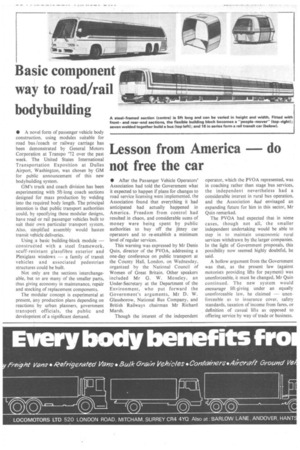Lesson from America do not free the car
Page 40

If you've noticed an error in this article please click here to report it so we can fix it.
• After the Passenger Vehicle Operators' Association had told the Government what it expected to happen if plans for changes to road service licensing were implemented, the Association found that everything it had anticipated had actually happened in America. Freedom from control had resulted in chaos, and considerable sums of money were being spent by public authorities to buy off the jitney car operators and to re-establish a minimum level of regular services.
This warning was expressed by Mr Denis Quin, director of the PVOA, addressing a one-day conference on public transport at the County Hall, London, on Wednesday, organized by the National Council of Women of Great Britain. Other speakers included Mr G. W. Moseley, an Under-Secretary at the Department of the Environment, who put forward the Government's arguments, Mr D. W. Glassborow, National Bus Company, and British Railways chairman Mr Richard Marsh.
Though the interest of the independent operator, which the PVOA represented, was in coaching rather than stage bus services, the independent nevertheless had a considerable interest in rural bus operation, and the Association had envisaged an expanding future for him in this sector, Mr Quin remarked.
The PVOA had expected that in some cases, though not all,. the smaller independent undertaking would be able to step in to maintain uneconomic rural services withdrawn by the larger companies. In the light of Government proposals, this possibility now seemed highly doubtful, he said.
A hollow argument from the Government was that, as the present law (against motorists providing lifts for payment) was unenforceable, it must be changed, Mr Quin continued. The new system would encourage lift-giving under an equally unenforceable law, he claimed -unenforceable as to insurance cover, safety standards, taxation of income from fares, or definition of casual lifts as opposed to offering service by way of trade or business.
















































































































































